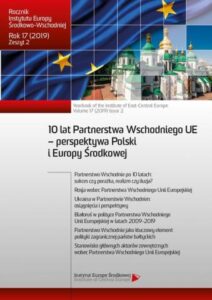ORCID: Anna Magdalena Kosińska: 0000-0002-0915-874X
Strony: 277-291
Wydanie: Lublin 2019
DOI: https://doi.org/10.36874/RIESW.2019.2.11
Sposób cytowania: A. M. Kosińska, Standard bezpieczeństwa migracyjnego w świetle aktualnego orzecznictwa Trybunału Sprawiedliwości Unii Europejskiej w sprawach dublińskich, „Rocznik Instytutu Europy Środkowo-Wschodniej” 17 (2019), z. 2, s. 277-291, DOI: https://doi.org/10.36874/RIESW.2019.2.11.
Słowa kluczowe: Dublin II Regulation, irregular migration, kryzys migracyjny, migration crisis, migration security
Keywords: asylum migration, Dublin II Regulation, irregular migration, migration crisis, migration security
Abstrakt:
The article analyses the current, post-crisis case-law of the Court of Justice of the European Union (CJEU) in cases concerning the so-called Dublin Regulation, i.e. Regulation 604/2013, which establishes the criteria and mechanisms for determining the Member State responsible for examining an application for international protection lodged in one of the Member States by a third-country national. The aim of the article is to analyze the standard of migration security in the area of Dublin cases. The key problem for the discussed issue was the judgment in the Jawo case, in which the Court of Justice examined the admissibility of Dublin transfers to the Italian Republic on the grounds that there was a risk of extreme material deprivation of the migrant. The Jawo case is a continuation of high-profile international court rulings in cases such as M.S.S., Tarakhel (ECtHR) and N.S. (CJEU), which decided to suspend transfers to Italy and Greece. Apart from the issues of protection against inhuman treatment, the jurisprudence of the CJEU also draws attention to the issues of legal security, effectiveness and accessibility of administrative procedures for third-country nationals seeking international protection in the EU. Finally, the standard of migration security in the Dublin area also includes the obligation to act in solidarity and mutual trust between the Member States, as set out in the judgments of the CJEU.
Bibliografia:
Brekke J.-P., Brochmann G., Stuck in Transit: Secondary Migration of Asylum Seekers in Europe, National Differences, and the Dublin Regulation, „Journal of Refugee Studies” 2014, vol. 28, no. 2, s. 145-162.
Brouwer E., Mutual Trust and the Dublin Regulation: Protection of Fundamental Rights in the EU and the Burden of Proof, „Utrecht Law Review” 2013, vol. 9, issue 1, s. 135-147.
Chlebny J., Zakres kontroli sądowej decyzji dublińskiej, [w:] Status cudzoziemca w Polsce wobec współczesnych wyzwań międzynarodowych, red. D. Pudzianowska, Warszawa 2016, s. 135-149.
European Commission, Changing Influx of Asylum Seekers 2014-2016. Synthesis Report for the EMN Study, August 2018, https://ec.europa.eu/home-affairs/sites/homeaffairs/files/00_eu_changing_influx_study_synthesis_final_en.pdf [30.05.2019].
Garlick M., The Dublin System, Solidarity and Individual Rights, [w:] Reforming the Common European Asylum System. The New European Refugee Law, ed. V. Chetail, Ph. De Bruycker, F. Maiani, Leiden–Boston 2016, s. 159-196.
Groenendijk K., Brexit: Free Movement of Union Citizens and the Rights of Third-Country Nationals under Threat?, [w:] Migration on the Move. Essays on the Dynamics of Migration, ed. C. Grutters, S. Mantu, P. Minderhoud, Boston–Leiden 2017.
Haddad E., Sovereign Rights, Human Rights and Security, [w:] The Refugee in International Society. Between Sovereigns, Cambridge 2008, s. 286-302.
Kosińska A., Znaczenie wyroku w sprawie Tarakhel przeciwko Szwajcarii wobec problemu napływu osób poszukujących ochrony międzynarodowej do Republiki Włoskiej, „Studi polacco-italiani di Toruń / Toruńskie studia polsko-włoskie” 2015, s. 69-86.
Kosińska A. M., The Creative Role of the European Council in the Area of Managing Asylum Migration and Return of Third-Country Nationals to Their Country of Origin in the Times of the Migration Crisis, „Yearbook of Polish European Studies” 2017, vol. 20, s.101-128.
Kosińska A. M., Mikołajczyk B., Does the Right to Migration Security Already Exist? Considerations from the Perspective of the EU’s Legal System, „European Journal of Migration and Law” 2019, vol. 21, issue 1, s. 83-116.
McMahon A., The Role of State in Immigration Control. The legitimacy Gap and Moves towards a Regional Model, Leiden–Boston 2017.
Migration: Key Fundamental Rights Concerns, 1.01.2019-31.03.2019, FRA 2019, www.fra.europa.eu [30.05.2019].
Mikołajczyk B., Mechanizm dubliński na rozdrożu – uwagi w związku z pracami nad rozporządzeniem Dublin IV, „Europejski Przegląd Sądowy” 2018, nr 3, s. 4-10.
Negrut V., Applying the legal security principle in administrative law, „Acta Universitatis Danubius. Juridica” 2012, vol. 8, no. 1, s. 5-13.
Oberleitner G., Salomon S., Whose Security? Introductory Remarks on People on the Move and the Reclaiming of Security, [w:] Blurring Boundaries: Human Security and Forced Migration, ed. S. Salomon, L. Heschl, G. Oberleitner, W. Bedenek, Leiden–Boston 2017, s. 3-22.
Vedsted-Hansen J., Current Protection Dilemmas in the European Union, [w:] Migration on the Move. Essays on the Dynamics of Migration, ed. C. Grutters, S. Mantu, P. Minderhoud, Boston–Leiden 2017, s. 95-117.

PDF: Pobierz